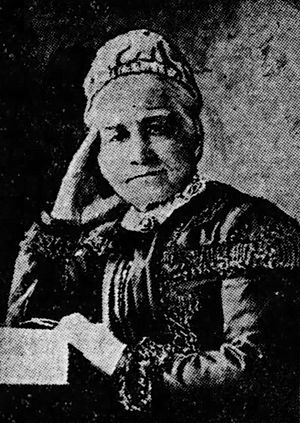Ruth Wills facts for kids
Quick facts for kids
Ruth Wills
|
|
|---|---|
 |
|
| Born | 22 December 1826 Leicester, England |
| Died | 18 November 1908 (aged 81) Leicester, England |
| Occupation |
|
Ruth Wills (born December 22, 1826 – died November 18, 1908) was an English poet. She was also a factory worker for most of her life.
Contents
Early Life and Challenges
Ruth Wills was born in Leicester, England, on December 22, 1826. Her mother, Susannah Wills, was a framework knitter. This means she made fabric using a special machine called a knitting frame. Ruth's father, Joseph Wills, had been a soldier.
When Ruth was a baby, she had a paralytic stroke. This caused a disability that affected her for her whole life. When she was just seven years old, her father died. This meant Ruth had to start working long hours to help her mother earn money.
Starting Work at the Factory
In 1837, when Ruth was eleven, she began working at a factory called N. Corah & Sons. It was a hosiery factory in Leicester. Hosiery means socks, stockings, and other knitted clothing. Ruth worked there until she retired.
Education and Love for Books
Even though she worked hard, Ruth also went to school. She attended a dame school for two years. A dame school was a small, private school often run by a woman in her own home. Ruth also went to a sunday school.
Her parents could not read or write. But Ruth learned to read and loved books. She became a very keen reader. Later, she even learned to read in French and German!
Her Journey as a Poet
Ruth Wills started writing poetry at a young age. When she was a teenager, her first poem was published in a magazine called Children's Magazine. Her poems also appeared in newspapers in Leicester.
In 1861, she published her first collection of poems. It was called Lays of Lowly Life. "Lays" means songs or poems, and "lowly life" refers to the lives of ordinary, working-class people.
Seven years later, in 1868, she published a second book of poems. This one was titled Lays of Lowly Life: Second Series. This collection included poems about important issues. Some of her poems talked about slavery. Others spoke about the oppression of women, which means the unfair treatment and control of women.
Later Years and Legacy
As she got older, Ruth Wills took on more important roles at the factory. She worked as a foreman and later as a manager. She died at her home in Leicester on November 18, 1908, when she was 81 years old.
Ruth Wills is remembered as an important poet who wrote about the lives and struggles of working people in England.
 | Leon Lynch |
 | Milton P. Webster |
 | Ferdinand Smith |

